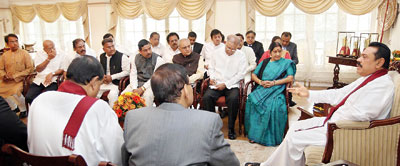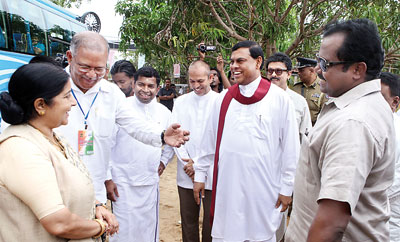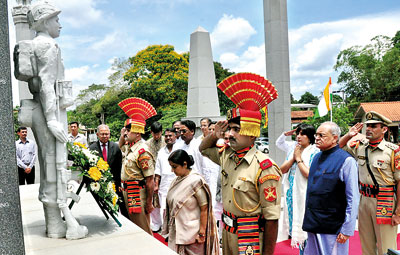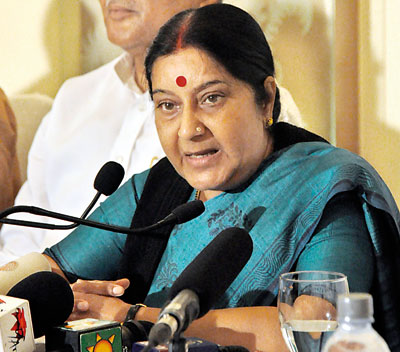External Affairs Minister Gamini Lakshman Peiris, made a colossal diplomatic blunder last Monday.
To use his own words: "Your Excellency Dr. Riyad-al-Maliki, Foreign Minister of the State of Israel, Your Excellency the Ambassador of Israel, Deputy Minister of External Affairs of Sri Lanka, Secretary to our Ministry, Ladies and Gentlemen of the media. I am very happy to extend on this occasion a very cordial welcome………."
There was neither the Foreign Minister of the state of Israel nor its Ambassador present at the External Affairs Ministry in Colombo where a news conference was held. The two dignitaries were in fact representing the state of Palestine. Foreign Minister Maliki had accompanied Palestinian President Mahmoud Abbas on a two-day visit to Sri Lanka. He was with Peiris for a joint news conference. Also present was the Palestine Ambassador Dr. Anwar Al Agha.
The faces of doctors Maliki and Agha reddened. They blushed as Peiris continued referring twice to Israel. The uneasy body language of Ambassador Agha prompted Peiris to realise his blunder. He said "sorry" very matter of factly and continued.
At least for a while, it seemed that the External Affairs Minister of Sri Lanka did not know the difference between Israel and Palestine. Sri Lanka not only enjoyed close ties with Palestine but President Mahinda Rajapaksa, who was then a budding MP, was a champion of the Palestinian cause. He then headed the Sri Lanka chapter of the Movement for Solidarity with Palestine. In his honour, the state of Palestine named one of their streets President Mahinda Rajapaksa Avenue.
That was in the presence of the local and foreign media in Sri Lanka. The video of Peiris' remarks can be seen on website www.sundaytimes.lk. Needless to say that it is one of the biggest gaffes by an External Affairs (Foreign) Minister in post-independent Sri Lanka.
There was some similarity in a different direction last Sunday. US President Barrack Obama made what was described as an "uncharacteristic error" by referring to Malvinas as the Maldives. These two words were used to describe his gaffe since his predecessor; George W. Bush was reputed for many, some bordering on the dumb side. Obama was speaking at the summit of the Americas in Cartagena, Columbia. Malvinas is the Spanish name for the Falkland Islands located off the south eastern coast of South America.
Wrong name calling apart, the Obama remarks were a declaration of "neutrality" over the British held islands to which Argentina has continued to lay claims. In 1982 'iron lady" Prime Minister, Margaret Thatcher ordered British troops, with the help of Chile, to defend the islands from Argentinian seizure. Her political courage won her the sobriquet of being 'the only man in the cabinet'. She was swept to power on a tidal wave of popularity at the parliamentary elections that followed.
Peiris is no Barrack Obama. Nor were his remarks a nuanced diplomatic message that had to be delivered with the greatest subtlety possible. It is a case of sheer diplomatic blunder, just one of the many that are now occurring under a directionless and thoroughly divided Ministry of External Affairs. This is notwithstanding Peiris ironing his political clothes for a five-day visit next month to Washington DC for talks with key officials of the Obama administration.
It comes at a time when internecine feuding within UPFA government ranks after last month's UN Human Rights Council sessions in Geneva is playing out publicly. This is after two jumbo sized delegations that attended the 'high level' segment and subsequent session of the UNHRC failed to stall a US-backed resolution on Sri Lanka. Post mortems continue. A government source said some votes were swayed in Sri Lanka's favour after China intervened at the eleventh hour, just after knowing India was going to back the resolution. This also led to one or two countries being persuaded to abstain. Leading members of the Sri Lankan delegation did not know their numbers. One of them, who spoke on grounds of anonymity said, "We could not keep a count. Some were coming and the others were leaving." Of course, that cost millions and millions of dollars, the member said.
 |
| India's Opposition Leader Sushma Swaraj along with her delegation meets President Mahinda Rajapaksa at Temple Trees yesterday morning. |
 |
| Meets with Ministers V. Muralitharan, S. Chandrakanthan and Basil Rajapaksa at the opening of the Batticoloa National Vocational Training Centre. |
 |
| A visit to the IPKF Monument in Battaraulla. |
 |
| With Internally Displaced Persons (IDP's) at Vavuniya. |
 |
| At yesterday's press conference. |
 |
| With Minister Rauff Hakeem. |
Sifting through the hemming and hawing, finger pointing and contradictory remarks by government leaders, their scholarly backers and commentators reveal a stark reality. After all, the UPFA government has decided to heed the key provisions of the resolution. The most important of them is the formulation of an Action Plan, which the resolution demands should detail "the steps that the government has taken and will take to implement" the recommendations of the Lessons Learnt and Reconciliation Commission (LLRC).
The man tasked with the responsibility of formulating such an Action Plan is External Affairs Minister Peiris. He has already produced the outlines of such a plan with the help of a senior External Affairs Ministry official and the document, at least for the present, remains a "Top Secret." Peiris will share the contents of this Action Plan when he meets Secretary Clinton for talks in Washington next month. This is how he will convince her that the UPFA government will, after all, heed the US-backed resolution passed at the UNHRC in Geneva last month. Whilst retaining this 'top secret' document with him, Peiris has formulated in Sinhala a document containing a series of recommendations made by the LLRC.
Copies were distributed to party leaders last Wednesday evening, hours ahead of the weekly cabinet meeting. President Mahinda Rajapaksa called upon them to make a close study and come up with their own observations before April 28. In other words, party leaders will help decide which of the LLRC recommendations should be in the Action Plan. Rajapaksa who will be on an official visit to South Korea next week is expected to be in Colombo ahead of the deadline.
The move to circulate a document containing the LLRC recommendations which the government wants to implement through an Action Plan highlights two significant aspects. Rajapaksa wants the constituent partners in the UPFA government to go along with him on any course of action the government would pursue. Such a position, there is little doubt, will not necessarily meet the parameters set out in the UNHRC resolution. There is a strong likelihood that the party leaders would further water down Peiris' document leaving only those recommendations acceptable to them to be included in the Action Plan. The resolution not only calls for "a comprehensive action plan" but also adds that the government should address the "alleged violations of international law."
Peiris told Parliament last month during a debate on the UNHRC resolution that the government would not implement all the recommendations of the LLRC. Thus, his draft Action Plan, it is clear, will be selective and will become even more selective when the party leaders take a final decision come April 28. The relevant part of the debate last month gives an insight:
"G.L. Peiris: Our opinion is that we accept this commission report in general. Minister Nimal Siripala de Silva made a statement about this in parliament. That does not mean if there are 160 recommendations that all 160 recommendations will be implemented. That is a very unreasonable interpretation.
"Joseph Michael Perera (UNP): What are you implementing? We clearly asked what has been accepted, and what has not been accepted. That's all we need to know.
"Peiris: Hon member, some cannot be implemented. The Commission report says about the first stage. That means it should be implemented step by step.
"John Amaratunga (UNP): Hon. Minister, tell us what are the recommendations that you are accepting and whether they will be mplemented.
"Peiris: That is not possible.
"John Amaratunga (UNP): That is the crux of this debate.
"Peiris: No, it is not. Nowhere in the world, in any situation, has any government at the very outset said, "Out of 250 recommendations, we are accepting these 120 and not the others". It has never happened; It has never happened, because it is not a practical proposition."
The formulation of an Action Plan and other preparations come in view of Peiris' impending visit to Washington DC. He is due to meet US Secretary of State, Hillary Clinton on May 18 for bi-lateral talks. According to present indications, Peiris is to be accompanied by Presidential Secretary Lalith Weeratunga, Sajin Vass Gunawardena, 'Monitoring MP' of the Ministry of External Affairs and Namal Rajapaksa, MP. Officials accompanying them will include Kshenuka Seneviratne, Additional Secretary in the Ministry of External Affairs and T.N. Gamlath, Co-ordinating Secretary to the External Affairs Minister.
On instructions from the Ministry of External Affairs, Sri Lanka's Ambassador to US, Jaliya Wickremesuriya met Robert Blake, Assistant Secretary in the State Department for South and Central Asian Affairs, last Monday afternoon to confirm the visit. The delegation will arrive in Washington on May 14.
Peiris is expected to meet Congressional leaders, deliver a talk at the Brookings Institution and meet other foreign policy groups according to his draft itinerary. He wants to tell them that the government now has an Action Plan to implement some recommendations of the LLRC in accordance with the UNHRC resolution. However, he will not go public with the plan itself. Namal Rajapaksa is also scheduled to attend some youth related events as part of a special itinerary being prepared for him. The meeting with Clinton will take place in the morning of May 18 and the delegation will leave the US capital the same evening. Ahead of that, both Clinton and Peiris are likely to hold a joint news conference. Besides matters relating to the Action Plan, the US is also expected to raise the case of persons reported missing and alleged abductions in Sri Lanka.
Secretary Clinton had invited Peiris to visit Washington in March, well ahead of the UN Human Rights Council sessions in Geneva. Besides discussing bilateral issues, which would have included matters contained in the resolution, he was told that such a visit would afford Peiris an opportunity to meet with Congressional leaders and others. Senior External Affairs Ministry officials still opine that such a visit could have either obviated or led to a resolution acceptable to the government of Sri Lanka and carried through unanimously. However, Peiris said that Clinton's letter had arrived on January 25, during a "holiday period" and "we did not have a full month." More importantly, Peiris took up the position that "foreign influence is not good for the internal process that has commenced."
Here is what Peiris said at the same parliamentary debate: "We have no animosity with the US. However, we maintain that the decision which they (the US) took was not correct. You all know that this report (LLRC) was submitted to Parliament on December 17. Thereafter it was the holiday period. Ms. Hillary Clinton's letter is dated January 25. Therefore we did not have a full month. Such foreign influence is not good for the internal process which had commenced. This is the stand we had taken. We made this clear to the US government. We thought their decision was not correct. I have no problem in meeting with Ms Hillary Clinton. Her husband, the former President Bill Clinton and I were students at Oxford together. We are Rhodes scholars……….."
In the light of these remarks, the question that begs answer is why Peiris, who spoke of foreign influence being an obstacle, is now busy formulating an Action Plan for US scrutiny. That too, within a hurried time frame so he could place it before Ms Clinton. As a result, why he avoided the US visit until the resolution was passed in Geneva and is now seeking "redress", to say the least, sounds both illogical and irrational to a student of foreign affairs. It is perhaps based on the axiom that it is better late than never. If that is the case, is it not a poor reflection on Peiris and how he conducts the country's foreign policy? One could argue that the lessons have been learnt. On the other hand, his course of action would drown the voices that shouted hoarse about "foreign interference", those who said the resolution was "non-binding" and others who thumped their chests screaming over "infringement of Sri Lankan sovereignty." They all seem to boil down to one thing - the way Sri Lanka's foreign policy is now being conducted. Ironic as it may seem, it is to first let the damage to occur and make efforts thereafter to control it.
Again, Peiris' remarks about former President Clinton being a contemporary at Oxford would naturally give rise to some questions in the Sri Lankan mind. "The old boy network" is a parlance often used in the conduct of not only diplomacy but also business. It underscores how previous relationships have been put to best use to win concessions or cause change of heart in dialogues between individuals or states. Examples are aplenty. That the man in charge of the conduct of Sri Lanka's foreign policy could make a proud boast of his links to a former US President of being a contemporary at Oxford is one thing.
Sri Lankans would now know that leading business entrepreneur Harry Jayawardena is not the only Sri Lankan Clinton ally. There is Peiris too. It is another that he has not been able to put to use that claimed relationship for his own country, his own government. It is all the more striking to those who were privy to behind the scenes goings on in the centres of UPFA power in the days ahead of the US-backed resolution being adopted in Geneva. The Sunday Times learnt that government leaders were engaged in a strong bid to reach out to key US dignitaries through different conduits. They were ready for some softening up or bargaining. However, the moves did not succeed.
In the light of Peiris' Action Plan and other preparations for the Washington visit, a number of issues come to the fore. One is how he will chart his course over areas not covered by his plan. First among the three main elements in the UNHRC resolution is the call on the government to "implement the constructive recommendations" made in the LLRC report and to "take all additional steps to fulfil its relevant legal obligations and commitment to initiate credible and independent actions to ensure justice, accountability and reconciliation for all Sri Lankans." There is little doubt that the positions of both Colombo and Washington will vary on what are "constructive recommendations" of the LLRC besides the definition of "credible and independent actions."
Equally important will be the third element in the resolution. It "encourages the Office of the United Nations High Commissioner for Human Rights and relevant special procedures mandate holders to provide, in consultation with, and with the concurrence of, the government of Sri Lanka, advice and technical assistance on implementing the above-mentioned steps; (reference is to the two previous elements) and requests the office of the High Commissioner to present a report on the provision of such assistance to the Human Rights Council at its twenty-second session." In the previous draft resolution, such a move was to be without "consultation" and "concurrence" of the government of Sri Lanka. However, at India's insistence the two words, which are self-explanatory, were included thus moderating the resolution considerably.
The government is now awaiting a communication from the UN Human Rights High Commissioner Navaneetham Pillay identifying the "technical assistance" on offer to implement provisions in the resolution. Throwing more light in this regard is the civil society group Friday Forum. A statement from it noted, "The resolution either in its initial drafts or as adopted, did not contemplate the UNHRC forcing Sri Lanka to obtain advice and technical expertise from the international human rights mechanisms. The office of the High Commissioner of Human Rights and Special Procedure mandate holders can only come to a country at the invitation of its government. (In fact the Special Procedure mandate holder on torture visited this country at the invitation of the government). This was implicit in the original resolution but was stated clearly in the amendment introduced by India……"
The reference is to a visit to Colombo in October 2007 by Manfred Novak, UN Special Rapporteur on torture and other cruel, inhuman and degrading treatment. His office is one such mandate holder. Novak later told the UN General Assembly Committee dealing with social, humanitarian and cultural issues, better known as the Third Committee, that "the high number of indictments for torture filed by the Attorney General's Office, the number of successful fundamental rights cases decided by the Supreme Court of Sri Lanka, as well as the high number of complaints that the National Human Rights Commission continues to receive on an almost daily basis indicates that torture is widely practiced in Sri Lanka." He claimed that "this practice is prone to become routine in the context of counter-terrorism operations." Sri Lanka's then Permanent Representative to the UN, Prasad Kariyawasam refuted Novak's claims.
This time too, Pillay's office is certain to either consult or seek the government's concurrence for visits by "relevant special procedures mandate holders." Their "findings," together with Pillay's own will be placed before the 22nd sessions of the UNHRC in March next year. Thus, it would become the yardstick for 'international stock taking' when the progress of the resolution is discussed. The United States, the main sponsor of the resolution would have its own 'findings' to add and that will sure include what Peiris and members of his delegation will say or do in Washington.
Another subject of importance in this regard would be the process of reconciliation, a matter on which several important recommendations have been made by the LLRC. At present, the proposed Parliamentary Select Committee to formulate a political package remains in limbo. Talks between the government and the Tamil National Alliance (TNA) have also not got off the ground. Hence, what the Sri Lanka delegation would tell the US on the reconciliation process remains a critical question.
The US position on reconciliation was articulated to Congress in a report last month by Stephen J. Rapp, head of the Office of Global Criminal Justice in the Department of State. He is widely regarded as President Barrack Obama's point man for war crimes. Rapp told Congress in a report after his visit to Sri Lanka in March, that the US supports government's efforts at reconciliation. He added, "Accountability for violations committed by both sides of the conflict and justice for the victims are critical features of that reconciliation because it allows communities to affirm a common commitment to principles of justice and to cope with the years of ravages from armed conflict. Truth and accountability for the crimes committed during the last months of the conflict would prevent impunity and undermine those who wish to make the LTTE into future heroes…."
Adding pressure on the government in this regard is the visit to Sri Lanka by a 12-member Indian parliamentary delegation. It was led by the Leader of the Opposition in the Lok Sabha, Sushma Swaraj. Besides the declarations made by delegation members at yesterday's news conference, a more pointed outcome of their visit to Sri Lanka will come when the team returns home. It was significant to note that Swaraj received an almost 'head of state' attention during her visit, particularly when she declared open Indian-backed projects in the north and the south. One of the significant factors in India's democracy was that it was the Opposition Leader who was leading a formal Indian parliamentary delegation. Importantly, the Indian delegation was unanimous in their opinion, expressed publicly, that the government enforce provisions of the 13th Amendment to the Constitution to address Tamil grievances. In this lay a strong message for the government -- when it comes to foreign policy issues, both the government and the opposition in India stand united.
Needless to say, it is quite different in Sri Lanka. In the wake of recent developments, particularly after the UN Human Rights Council sessions in Geneva, a key question is what forms at least the highlights of the foreign policy of the UPFA government. If indeed there is one, little is known of it. This explains the many contradictory statements that are being made by government leaders and officials. In that backdrop, Peiris' Action Plan, which remains top secret would draw considerable attention. Before next Saturday, party leaders would have made clear what they would like to be implemented from the recommendations of the LLRC. The question is whether Sri Lankans will know of the Action Plan's contents before or after Hillary Clinton has seen it.
|
